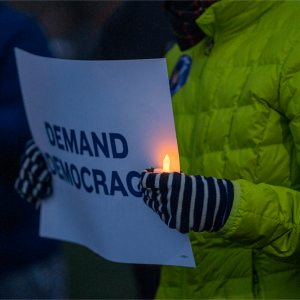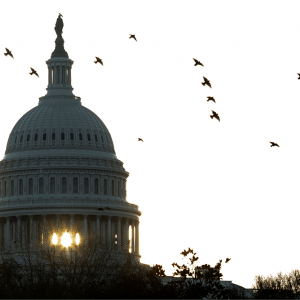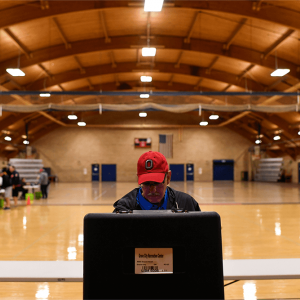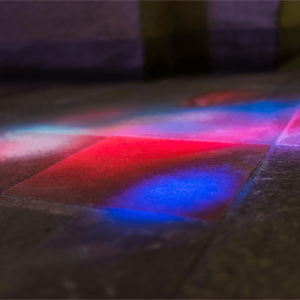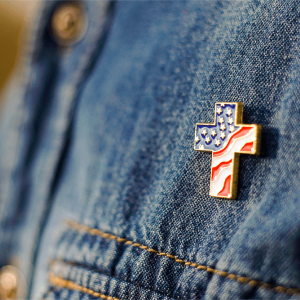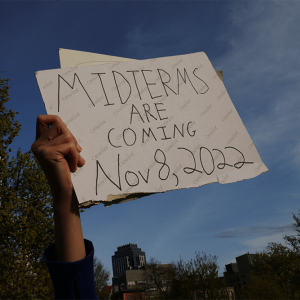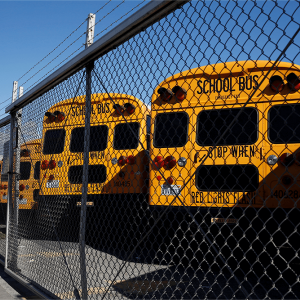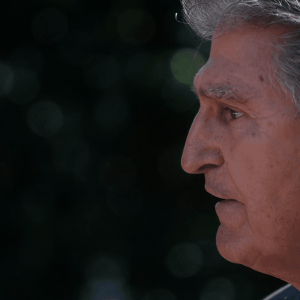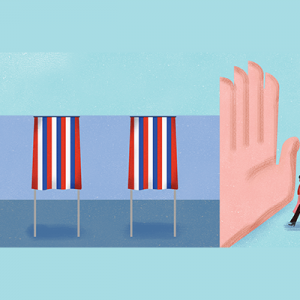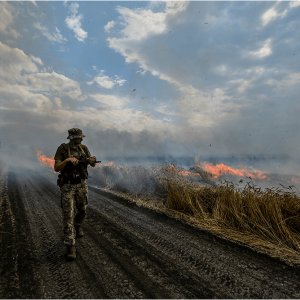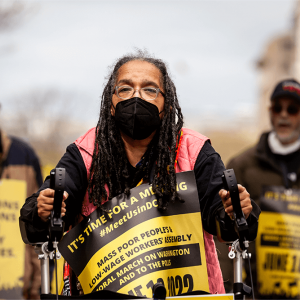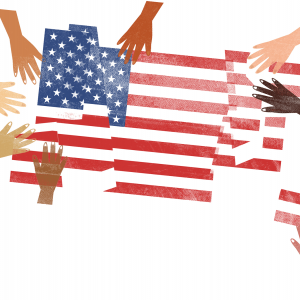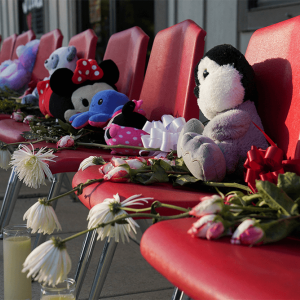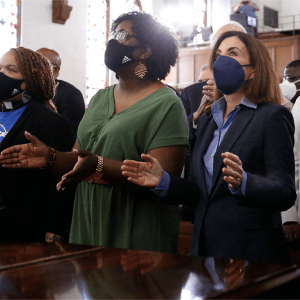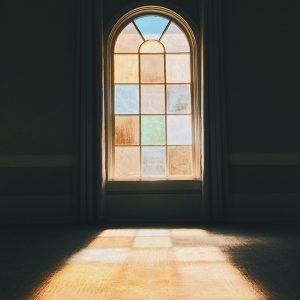
Rev. Adam Russell Taylor is president of Sojourners and author of A More Perfect Union: A New Vision for Building the Beloved Community. Follow him on Bluesky @revadamtaylor.
Taylor previously led the Faith Initiative at the World Bank Group and served as the vice president in charge of Advocacy at World Vision U.S. and the senior political director at Sojourners. He has also served as the executive director of Global Justice, an organization that educates and mobilizes students around global human rights and economic justice. He was selected for the 2009/2010 class of White House Fellows and served in the White House Office of Cabinet Affairs and Public Engagement. Taylor is a graduate of Emory University, the Harvard University Kennedy School of Government, and the Samuel DeWitt Proctor School of Theology. Taylor also serves on the Independent Sector Board, the Global Advisory Board of Tearfund UK, and is a member of the inaugural class of the Aspen Institute Civil Society Fellowship. Taylor is ordained in the American Baptist Church and the Progressive National Baptist Convention and serves in ministry at the Alfred Street Baptist Church in Alexandria, Va.
Speaking Topics
- Human rights and global poverty
- Racial justice
- Voting rights
- Climate justice
- Economic justice
- Immigration
- Peace and nonviolence
- His most recent book, A More Perfect Union: A New Vision for Building the Beloved Community
Speaking Format
- Virtual and in-person events, also available for preaching
Languages
- Fluent in English
Past Notable Events
- Tufts University’s Russell Lecture
- United Church of Christ General Synod Gathering Keynote
- Children’s Defense Fund Staff Retreat Keynote
- Parliament of the World Religions
- Christian Community Development Association Keynote Panel
Posts By This Author
We Still Need Moral Accountability for Jan. 6
In the immediate aftermath of Jan. 6, 2021, I naively believed that the violent attempt to overturn the 2020 election outcome would serve as a breaking point for the nation and the Republican Party. Despite the party’s anti-democratic slide, including so many embracing the lie that the 2020 election was stolen, I thought the collective horror of the day — felt across the political spectrum — would awaken everyone to the danger that former President Donald Trump and his enablers posed to our democracy. Of course, we now know that isn't what happened.
Why The Bible's Teaching on Lending Matters to Climate Justice
I know talking about international lending policies makes most people want to yawn, but the Bible takes debt — and the people who profit from it — seriously. In his opening Nazareth sermon (Luke 4), Jesus cites the prophet Isaiah to proclaim “the year of the Lord’s favor,” a passage that evokes the ancient instructions for debt forgiveness, such as those found in Deuteronomy 15 (“Every seventh year you shall grant a remission of debts”). While biblical scholars can’t confirm that these Jubilee injunctions were fully lived out, these instructions were understood to be a regular course corrective to extreme inequality and injustice. Other parts of the Bible flat-out forbid charging interest when the person seeking the loan is poor (Exodus 22:25, Leviticus 25:37).
The Men's World Cup Is Part of My Advent Journey. Yes, Really
I can’t deny the unbridled excitement that this global phenomenon unleashes every four years. And since this year’s tournament is taking place in November (to avoid Qatar’s crushing summer heat), the international fervor coincides with the start of Advent. Somehow, it all feels fitting.
Midterms Are Over; Our Civic Discipleship Isn't
Voting, while essential, is just the starting point when it comes to following the mission Jesus outlines in his initial sermon in Nazareth to “bring good news to the poor … and proclaim the year of the Lord’s favor” (Luke 4:18-19). Civic discipleship recognizes that in our democracy — imperfect as it may be — fulfilling Jesus’ call to bring God’s reign of justice, righteousness, and inclusive love closer to earth requires that we are actively and at times courageously engaged in our politics. The marriage of our civic participation with being followers of Jesus is rooted in the conviction that our deep civic engagement is because of our faith, not despite it.
We Got a Historic Climate Bill, but There's Still Work to Do
Why this could be the year we start saving the planet (and what Christians can do to help).
IN AUGUST, President Joe Biden signed the Inflation Reduction Act (IRA), the most significant legislation ever passed by Congress to address climate change. But what happens now? After all, the days aren’t getting any cooler — a recent study by the First Street Foundation suggests that in 30 years more than 100 million Americans could experience heat index temperatures over 125 degrees Fahrenheit. In our polarized politics, there is already a great deal of confusion and obfuscation about what this historic bill will do. A related question: How will the IRA affect what people of faith do about the existential threat of climate change?
The IRA invests $369 billion over the next 10 years into tax incentives for renewable energy and electric vehicles, domestic manufacture of batteries and solar panels, and pollution reduction. The idea is to make renewable energy and electric vehicles more affordable, both to manufacture and to buy, thus encouraging more consumers to adopt them. The IRA also targets methane pollution by imposing an escalating fee on some oil and gas companies that emit too much methane in their operations and increasing royalty rates paid to the government on methane extraction from public lands. The IRA includes an unprecedented investment of $60 billion into environmental justice initiatives, including clean energy and emission reduction for low-income and disadvantaged communities, block grants for community-led projects in disadvantaged communities to “address disproportionate environmental and public health harms related to pollution and climate change,” and funding to reconnect communities divided by highways.
Blessed Are the Peacemakers In a Tense Election Season
Yet, in this charged atmosphere, Jesus calls us to be peacemakers — regardless of our political leanings or party affiliation. So, what does peacemaking look like during the upcoming midterms?
Being Apolitical Won’t Heal Polarized Churches
The church should be a place where people with divergent political views can coexist and be in fellowship because our unity in Christ supersedes our political and partisan loyalties. As the Apostle Paul reminded the Galatian church, in Christ “There is neither Jew nor Gentile, neither slave nor free, nor is there male and female, for you are all one in Christ Jesus.” But that’s not often what we see in our churches today, is it?
Do We Dare To Disciple People Out of Christian Nationalism?
As Christians, we need to keep denouncing the most blatant examples of Christian nationalism from politicians, faith leaders, and groups like the Proud Boys and Oath Keepers who participated in the Jan. 6 insurrection. Yet if we care about the integrity of the Christian faith, there is a more difficult — but equally important — challenge beyond these denunciations. We also need to address the subtle but insidious versions of Christian nationalism that so often seep into our churches.
Midterms Got You Down? 5 Ways People of Faith Can Take Action
While there’s no magic solution, now is the perfect time to make sure every eligible voter nationwide has everything they need to cast their vote, which increasingly means possessing knowledge, motivation, and determination. Here are five concrete and actionable ways that each of us can help empower and inspire every eligible voter to vote this November.
Heed Scripture — And Honor Teachers With Fair Wages
This Tuesday marked back to school day for my two boys, who are entering fourth and sixth grade at an Episcopal school that welcomes students of all faiths. The annual rite — which for our family always seems to involve the Mission: Impossible-style task, led by my wife, of getting all the right books and school supplies in time — left me with mixed feelings, which I suspect many fellow parents share. On one hand, I am excited for all the new school year offers my kids: new teachers, new friends, a new season of athletics, and all the other extracurricular activities that bring my kids so much joy. On the other, I feel the weight of a mounting crisis in our nation’s education system, especially in public schools, where the pandemic revealed such deep and long-standing racial inequities.
Offering Lament and Thanksgiving for the Inflation Reduction Act
Three weeks ago, it seemed impossible that this Congress and this president would be able to get anything significant and lasting done to confront climate change. But this week, President Joe Biden signed major climate legislation — the Inflation Reduction Act — into law. It’s a bittersweet moment.
Christians Should Resist Single-Issue Voting
The 2022 midterm election must be a referendum on protecting and strengthening our rights.
ON TUESDAY, NOV. 8, control of federal spending and legislation will be at stake with every seat in the House of Representatives up for election along with a third of the U.S. Senate, not to mention countless offices at the state and local level. Many of these races are critical for determining what the next few years will look like in the United States and beyond.
Christians should resist single-issue voting and instead apply our faith across a broad range of issues that impact human dignity and human flourishing. Our faith should inform and shape how we evaluate candidates and cast our ballots. While many important issues will be on the ballot this midterm—from inflation and the state of our economy to reproductive health, climate justice, our continued response to the COVID-19 pandemic, and a range of racial justice issues, to name just a few—increasingly the fate of democracy itself will be on the ballot. The challenge is that democracy is not often treated as a top-tier issue and can be easily taken for granted. As the House committee investigating the Jan. 6 insurrection has illuminated with sobering and chilling clarity, our democracy is not a given. A criminal conspiracy by former President Donald Trump and his allies to overturn the 2020 election and the ongoing efforts to erect new barriers to the right to vote have damaged and continue to imperil our democracy. In the face of these threats, it is important that the midterm election becomes a referendum on whether candidates are committed to protecting and strengthening a more inclusive and just multiracial democracy.
Many state legislatures have recently passed laws making it easier to interfere with and subvert election results, which alongside voter suppression directly threatens the health of U.S. democracy.
God Gave Us Abundance. Why Do People Go Hungry?
Proclaiming God’s abundance feels counterintuitive in a world filled with excruciating and growing hunger: In the United States, long-standing food deserts, racial inequities exacerbated by the COVID-19 pandemic, and a broken social safety system are all contributing to a growing crisis of hunger. Globally, at least 140 million people are currently affected by a dire food crisis; 49 million people are just one step away from famine conditions.
A Pastoral Letter to the Exhausted Majority
I know I’m not alone in feeling exhausted. In 2018, More In Common — a nonprofit that researches what’s driving political polarization — found that two-thirds of Americans share a series of characteristics that make them a part of what they call the “exhausted majority.” This group of people is “fed up with the polarization plaguing American government and society,” feels forgotten in the public discourse, and often has flexible views that don’t fit consistently in the Left/Right binary. Yet, they believe we can still find common ground. Sound familiar?
Jesus Prioritized Poor People. Our Politics Marginalize Them
Movements matter. When we join with others to make our voice heard, we have the power to spark people’s moral imagination and galvanize greater urgency to address issues that rarely show up in headlines or political priorities. This Saturday, the Poor People’s Campaign will convene on the National Mall in Washington, D.C., to address one of these overlooked crises: poverty.
Frederick Douglass, the Prophet Isaiah, and Healthy Patriotism
Required readings for resisting destructive forms of patriotism that bleed into extremist nationalism.
AS WE APPROACH Independence Day, I’m anxious the holiday will be overshadowed by the pitched battles waged around what we teach about our nation’s history, continued assaults on our democracy, and the struggle over how we understand and express patriotism. In the face of these trends and the alarming prominence of white Christian nationalism, it is imperative that we resist destructive forms of patriotism that bleed into nationalism. Instead, we should embrace a redemptive patriotism that celebrates the noble promises the country was built upon, even while we acknowledge and repent for the ways the country has fallen so short of living up to those ideals and extending them to everyone. Nationalism is often rooted in a revisionist and censored telling of history and fueled by a hatred and fear of the “other.” In contrast, a healthy patriotism must always be tied to the project of building a more just and inclusive America. By rededicating ourselves to this cause, the Fourth of July can serve as a day that fosters greater unity and advances shared ideals, rather than one that reinforces our divisions.
Frederick Douglass and the biblical prophet Isaiah lend us seemingly timeless tools to resolve this conundrum. In 1852, nearly a decade before the Civil War, Douglass, formerly enslaved until his escape, was asked to address the citizens of his hometown of Rochester, N.Y., on the nation’s 76th anniversary. This famous speech—“What to the Slave Is the Fourth of July?”—should be required reading for every American.
Why Christians Need To Watch the Jan. 6 Hearings
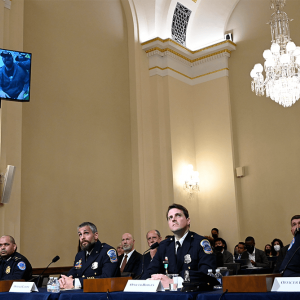
U.S. Capitol Police officer Sgt. Aquilino Gonell, DC Metropolitan Police Department officer Michael Fanone, DC Metropolitan Police Department officer Daniel Hodges, and US Capitol Police officer Harry Dunn watch a video of the Jan. 6 attack during a July 27, 2021 hearing of the House select committee investigating the Jan. 6 attack. Andrew Caballero-Reynolds/Pool via REUTERS
When the hearings air at 8:00 p.m. Eastern on major broadcast networks and many cable news channels, I will be watching. And I hope you watch too, even if you don’t consider yourself a political wonk. These hearings will be crucial for the future of our nation and our democracy; it’s imperative that Christians tune in and encourage others to do the same.
Our Numbness to Gun Violence Is a Spiritual Failure
Four days. That’s how long researchers have found that people’s sadness and outrage last after each major gun massacre in America. Perhaps this is our own defense mechanism kicking in or maybe we have become far too desensitized to this time loop of horrific gun violence. But anger that dissipates after four days dishonors the lives that are stolen. Four days isn’t enough time to sufficiently process and grieve. And it’s not nearly enough time to galvanize the political will necessary to overcome political fecklessness, particularly the degree to which the GOP remains captive to fierce advocates for gun rights.
Christians Can’t Be Lukewarm in Denouncing ‘Replacement Theory’
Before the public outcry dies down — and isn’t sad that we all know it will? — we must boldly and unequivocally denounce the great replacement theory and instead live out the great commandment. The great replacement theory draws on the worst of our nation’s history, falsely implying that nonwhite people are threats to our nation’s future. But the great commandment offers the best of our civic and religious values, reminding us that we are to love our neighbors as ourselves; it lends itself to a moral vision of multi-racial democracy in which everyone, regardless of race, ethnicity, and religion, is equally valued.
As a Christian, I Want to Reduce Abortion, Not Overturn Roe
Deeply flawed and alarming. That was my reaction last week as I read the leaked draft of the Supreme Court opinion that would repeal Roe v. Wade, unravelling nearly 50 years of judicial precedent and placing abortion rights into the hands of state lawmakers.
